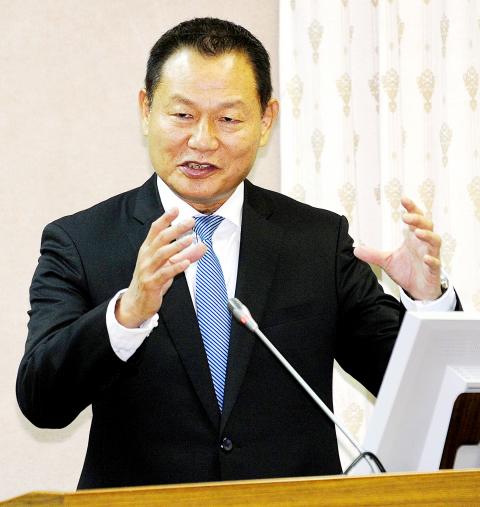China has been escalating its cyberwarfare against Taiwan, using an army of 180,000 cyberspies and more sophisticated methods to hack and steal information from government agencies and industries, the National Security Bureau (NSB) said in a report to the legislature yesterday.
The report said that this “cyberarmy” works at the Chinese People’s Liberation Army’s (PLA) General Staff Headquarters and its seven regional command centers, as well as national defense research and development agencies, state research centers and major universities.
“All our government and military agencies, industrial facilities, science and technology centers are vulnerable and under increasing attack by Chinese cyberwarfare,” NSB Director-General Lee Shying-jow (李翔宙) said.

Photo: Chen Chih-chu, Taipei Times
Taking his agency as an example, Lee said the bureau’s Web site detected 7.226 million hacking incidents last year, including 238,764 malicious attacks.
That is more than double the figure of 3.44 million hacking attempts (70,000 malicious attacks) found in 2012, bureau officials told lawmakers during a question-and-answer session in April last year.
Lee and bureau officials confirmed that the majority of these hacker intrusions and cyberattacks originated in China.
Lee said Taiwan faces an increasing Chinese cyberespionage threat on two fronts.
First, as the administration of government Web sites and network security management is increasingly contracted out to the private sector, China’s cyberarmy has targeted these Internet service providers and software developers, hacking into Web administrator accounts to plant malware or steal sensitive information from government sites.
Second is the upsurge in the use of smartphones, tablet computers and other personal mobile devices among the public and government employees, with the number estimated to have reached 10.53 million individuals last year, out of the nation’s total population of 23.37 million.
Lee said China’s cyberforce has developed various types of malicious apps and virus software that users unwittingly download to their telephones and other mobile devices.
“These malicious mobile apps hack into the user’s smartphone operating system, from where it gains access and hijacks personal data, including e-mail account passwords and contact lists, and can even monitor telephone conversations,” he added.
Taiwan’s national security and military agencies were alerted by a report by Canadian journal Kanwa Asian Defence Monthly this week, which said a PLA surveillance station on Hong Kong’s highest mountain, Tai Mo Shan, is equipped with the latest technology to intercept and record signals from cellphones, Wi-Fi networks and radio transmissions.
Kanwa said the station’s equipment includes an intelligence antenna typical of PLA Unit 61398 in Shanghai, which is said to be a main Chinese cyberwarfare and commercial espionage operations center against foreign countries.
Lee added that Chinese cyberspies had intensified their operations, targeting not only Taiwanese government agencies, but also political parties and their affiliated organizations, academics and research institutes, to collect personal information, such as job titles, e-mail addresses and telephone numbers.
These Chinese cyberunits then send out malware or viruses in the guise of e-mails announcing important official events to entice recipients to open them, allowing them to hack into these targeted groups, Lee said.

Right-wing political scientist Laura Fernandez on Sunday won Costa Rica’s presidential election by a landslide, after promising to crack down on rising violence linked to the cocaine trade. Fernandez’s nearest rival, economist Alvaro Ramos, conceded defeat as results showed the ruling party far exceeding the threshold of 40 percent needed to avoid a runoff. With 94 percent of polling stations counted, the political heir of outgoing Costa Rican President Rodrigo Chaves had captured 48.3 percent of the vote compared with Ramos’ 33.4 percent, the Supreme Electoral Tribunal said. As soon as the first results were announced, members of Fernandez’s Sovereign People’s Party

EMERGING FIELDS: The Chinese president said that the two countries would explore cooperation in green technology, the digital economy and artificial intelligence Chinese President Xi Jinping (習近平) yesterday called for an “equal and orderly multipolar world” in the face of “unilateral bullying,” in an apparent jab at the US. Xi was speaking during talks in Beijing with Uruguayan President Yamandu Orsi, the first South American leader to visit China since US special forces captured then-Venezuelan president Nicolas Maduro last month — an operation that Beijing condemned as a violation of sovereignty. Orsi follows a slew of leaders to have visited China seeking to boost ties with the world’s second-largest economy to hedge against US President Donald Trump’s increasingly unpredictable administration. “The international situation is fraught

MORE RESPONSIBILITY: Draftees would be expected to fight alongside professional soldiers, likely requiring the transformation of some training brigades into combat units The armed forces are to start incorporating new conscripts into combined arms brigades this year to enhance combat readiness, the Executive Yuan’s latest policy report said. The new policy would affect Taiwanese men entering the military for their compulsory service, which was extended to one year under reforms by then-president Tsai Ing-wen (蔡英文) in 2022. The conscripts would be trained to operate machine guns, uncrewed aerial vehicles, anti-tank guided missile launchers and Stinger air defense systems, the report said, adding that the basic training would be lengthened to eight weeks. After basic training, conscripts would be sorted into infantry battalions that would take

GROWING AMBITIONS: The scale and tempo of the operations show that the Strait has become the core theater for China to expand its security interests, the report said Chinese military aircraft incursions around Taiwan have surged nearly 15-fold over the past five years, according to a report released yesterday by the Democratic Progressive Party’s (DPP) Department of China Affairs. Sorties in the Taiwan Strait were previously irregular, totaling 380 in 2020, but have since evolved into routine operations, the report showed. “This demonstrates that the Taiwan Strait has become both the starting point and testing ground for Beijing’s expansionist ambitions,” it said. Driven by military expansionism, China is systematically pursuing actions aimed at altering the regional “status quo,” the department said, adding that Taiwan represents the most critical link in China’s